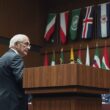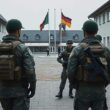Syria’s New Reality: Weak Winners and Uncertain Future
The greatest advantages of recent developments seem to have been gained by Turkey and, by extension, the National Syrian Army (SNA). The gains include territorial conquests at the expense of the Kurds. Israel, too, has known how to capitalize on the situation, having largely destroyed the Syrian Army’s equipment and gained control of more land on the Golan Heights. So far, they are the clear winners of the developments.
While the rebels in Idlib have gained power in Syria, this achievement means little and should not be misinterpreted as a sign of their own strength. Instead, it shows how far the power of Assad had already been eroded. The HTS (Hayat Tahrir al-Sham) must first consolidate its position. For now, it is unclear on which forces in the country it can rely.
The rapid capture of Damascus and the unexpected fall of Assad have surprised many forces in Syrian society. Who knows if the remaining parts of the army will submit to the new rulers? It is also uncertain if the new power in Damascus, Ahmad al-Sharaa, will be able to implement his plan to not allow weapons outside of state control.
According to his plans, all fighting groups are to lay down their arms and join the Syrian Army. However, instead of appointing a former member of the Syrian Army as Defense Minister, he has chosen Murhaf Abu Qasra, the organizer of the HTS offensive. This could lead to new conflict potential, not only among the armed groups themselves, but also in relations with neighboring countries. By doing so, the remaining military material would be put under the control of the very groups the Israeli Army had sought to deny access to, through its bombardments.
While the HTS has political power in Damascus, this does not mean it is in a stable position. The public’s attitude is still unclear, and for now, the fighters from Idlib seem to be able to rely only on their own strength. In this sense, they are even less stable than Assad was before his fall. Assad, at least, could rely on the army, even if it had abandoned him when it mattered most. He also had the Russians and Iranians behind him.
Neutral Russia and the opposition of Iran to the new rulers are a sign of the HTS’s uncertain future. The Turks, on the other hand, will likely support the new rulers in Damascus as long as their interests are served, which means the return of refugees to Syria and the dismantling of Kurdish fighting groups. Turkey’s influence is strong, and without its goodwill, Ahmad al-Sharaa will be unable to implement his plans in Syria.
This means that the HTS can only count on Turkish support if it fights against the Kurdish groups. This would be the logical consequence if al-Sharaa is to fulfill his promise to disarm all fighting groups and collect illegal weapons in Syria. The Kurdish groups and the SNA, supported by Turkey, are unlikely to comply with the HTS’s plans willingly.
The greatest danger to the fragile situation in Syria currently comes from the escalating conflict between the Syrian National Army, backed by Turkey, and the Kurdish Democratic Forces in Syria, supported by the United States. The US is in a difficult situation, perhaps the most difficult of all the parties involved, as it must balance the interests of the Kurds and those of its NATO partner, Turkey. This is not an easy task, as these interests fundamentally contradict each other.
The US and the West are less dependent on Turkey than they are on the Kurdish groups. The Kurds had already proven themselves useful in the Iraq War, and the US had promised them autonomy, which had given the Kurds hope for the creation of their own national state. The US had established a presence in the autonomous regions, and the Kurds had secured the borders, making it possible for the US to maintain a presence there. As long as the US maintains its forces in the Kurdish regions, the Kurds can be sure of protection against the attempts of neighboring countries to end their self-governance. Turkey, in turn, can be certain that the US will not engage in a conflict with it, as long as the Kurds are involved.
However, the Biden administration is deeply concerned that the IS fighters could use the chaos after Assad’s fall to regroup in the desert. This would significantly worsen the situation for US forces in Syria, as the designated President Trump had already made it clear that he has little inclination to continue engaging in Syria: “This is not our fight.”
At a hastily convened meeting with Turkish President Erdogan, US Secretary of State Antony Blinken called on Turkey to take action against the “Islamic State” after the fall of Assad. The US seems willing to abandon the Kurds if Turkey takes on the fight against IS.
Erdogan has agreed to take “preventive measures against all terrorist organizations, particularly against the Kurdish militias in Syria.” For the Kurds, difficult times may be ahead, as the US support wanes. Initially, the political West celebrated the fall of Assad, but now the US seems to be the most concerned about the situation in Syria.





